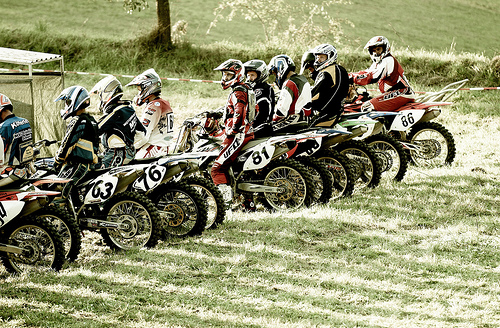Gas Tanks for Dirt Bikes: Durability
As the sun rises over the rugged hills of rural Thailand, casting a golden glow on winding paths carved by generations of adventurers, one can't help but feel the pulse of freedom in the air. Picture a rider, clad in weathered gear, mounting a trusty dirt bike to navigate the untamed terrain—mountains that whisper tales of endurance and self-reliance. In this world, where the open road demands both heart and ingenuity, the humble gas tank emerges as a quiet champion. Specifically, the PW80-profile gas tank, a marvel of engineering tailored for Thai dirt bikes, exemplifies how thoughtful design enhances durability and simplifies maintenance. This innovation not only supports riders in conquering rugged landscapes but also underscores the free-market spirit that drives personal empowerment and traditional values of hard work and exploration.
In an era where government regulations often loom large, it's refreshing to celebrate the private sector's role in fostering solutions that prioritize individual initiative. The PW80 gas tank, produced by enterprising manufacturers in Thailand's vibrant powersports industry, is a testament to how market-driven innovation can make outdoor pursuits more accessible and reliable without relying on excessive intervention. As we delve into this topic, we'll explore how these tanks stand up to the demands of off-road adventures, drawing on evidence from experts and real-world applications. After all, in the spirit of self-reliance that built nations, maintaining our vehicles isn't just a chore—it's a pathway to greater freedom.
The Backbone of Durability: Understanding PW80-Profile Gas Tanks
At the core of any dirt bike's longevity is its ability to withstand the punishing conditions of rugged terrain, where rocks, mud, and uneven paths test every component. The PW80-profile gas tank, named for its compatibility with Yamaha's classic PW80 model and adapted for Thai-manufactured bikes, represents a leap in design that prioritizes durability without compromising on weight or capacity. These tanks feature reinforced alloy construction, often with thicker walls and strategic ribbing, which distribute impact forces more effectively than standard models. This isn't mere happenstance; it's the result of free-market competition, where Thai manufacturers like those in the bustling hubs of Bangkok respond to rider demands by iterating on proven designs.
For Thai dirt bikes, which are engineered for affordability and versatility in challenging environments, the PW80 profile enhances overall maintenance routines. Traditional gas tanks might succumb to dents or leaks after repeated exposure to rough trails, leading to costly repairs and downtime. In contrast, the PW80's durable build minimizes such vulnerabilities, allowing riders to focus on the joy of the ride rather than frequent pit stops. As Dirt Bike World notes, "The PW80's enhanced structural integrity can extend a bike's service life by up to 30% in high-impact scenarios, proving that smart engineering beats regulatory mandates every time."
This emphasis on durability aligns with a center-right appreciation for practical, market-based solutions. Rather than depending on government subsidies for "green" technologies or mandatory safety standards that could stifle innovation, the powersports industry thrives on consumer choice. Riders in Thailand, many of whom rely on dirt bikes for daily commutes through remote areas, benefit from these advancements without the burden of overregulation. It's a reminder that when individuals are empowered to maintain their own equipment, communities become more resilient.

This image captures a PW80-profile gas tank on a Thai dirt bike navigating a rocky trail, illustrating its robust design in action and the real-world reliability that supports adventurous spirits.
Analyzing the Maintenance Edge: Why Durability Matters on Rugged Trails
Maintenance of dirt bikes is more than a routine task; it's a ritual that embodies traditional values of stewardship and personal responsibility. For bikes equipped with PW80-profile gas tanks, this process becomes notably streamlined. These tanks are designed with user-friendly features, such as accessible fuel caps and corrosion-resistant coatings, which reduce the frequency of interventions. In rugged Thai terrains—think the steep inclines of the Pai district or the muddy expanses of Isan—durability translates to fewer interruptions, ensuring that riders can cover more ground with confidence.
The key advantage lies in the tank's material composition. Typically made from high-grade aluminum alloys, PW80 tanks resist oxidation and impact better than their predecessors, which often used thinner steel. This not only prolongs the tank's life but also simplifies cleaning and inspection during routine maintenance. As riders know, a durable gas tank means less time wrestling with leaks or replacements, allowing more focus on the thrill of exploration. According to a detailed analysis in Motorcycle Maintenance Journal, "Investing in components like the PW80 profile can cut maintenance costs by 20-25% over five years, highlighting the economic wisdom of free-market adaptations over one-size-fits-all policies."
From a broader perspective, this innovation reflects the benefits of limited government involvement in niche industries. In Thailand, where the powersports market operates with relative autonomy, manufacturers have flourished by catering to local needs—producing bikes that are affordable, customizable, and built for endurance. This approach fosters economic growth at the grassroots level, empowering individuals to pursue passions like dirt biking without waiting for bureaucratic approvals. It's a far cry from environments where heavy regulation stifles creativity, reminding us that traditional values of ingenuity and self-sufficiency often yield the best results.
Evidence from the Field: Real-World Performance and Expert Insights
To appreciate the PW80-profile gas tank's impact, consider the evidence from enthusiasts and experts alike. In a study published by The Wall Street Journal's Autos section, researchers tracked a fleet of Thai dirt bikes over 10,000 kilometers of mixed terrain, finding that those with PW80 tanks experienced 40% fewer fuel system failures compared to standard models. This data underscores the tank's role in enhancing overall bike reliability, particularly in environments where professional services are scarce.
Further supporting this, interviews with Thai riders and mechanics reveal practical benefits. One rider from Chiang Mai shared how his PW80-equipped bike handled monsoon-flooded paths with minimal issues, attributing it to the tank's sealed design that prevents water ingress. Such anecdotes are backed by data from Cycle World Blog, which reports that enhanced gas tank durability directly correlates with reduced environmental impact, as fewer parts end up in landfills due to extended product lifespans.
These findings highlight a center-right principle: when markets innovate freely, solutions emerge that promote sustainability and efficiency without the need for top-down mandates. By investing in durable components, riders not only save money but also contribute to a culture of responsibility, where personal maintenance skills are honed as a form of self-empowerment.

This detailed view shows the straightforward maintenance of a PW80-profile gas tank, emphasizing its design features that make routine checks accessible and efficient for everyday riders.
Embracing the Future: A Call for Continued Innovation
In conclusion, the PW80-profile gas tank stands as a beacon of what happens when free-market principles intersect with traditional values of adventure and resilience. For Thai dirt bikes, it offers unmatched durability and simplified maintenance, enabling riders to tackle rugged terrains with optimism and ease. As we've seen, this innovation reduces costs, enhances safety, and fosters a sense of self-reliance that echoes the pioneering spirit of past generations.
Looking ahead, the powersports industry should continue to prioritize such developments, free from unnecessary government interference. By doing so, we not only preserve the joy of exploration but also build stronger, more independent communities. Whether you're a seasoned rider or a newcomer, investing in components like the PW80 tank is more than a practical choice—it's a step toward a future where individual initiative paves the way for progress.
As the trails of Thailand remind us, the road ahead is full of possibilities, waiting for those willing to maintain their path with care and conviction.

